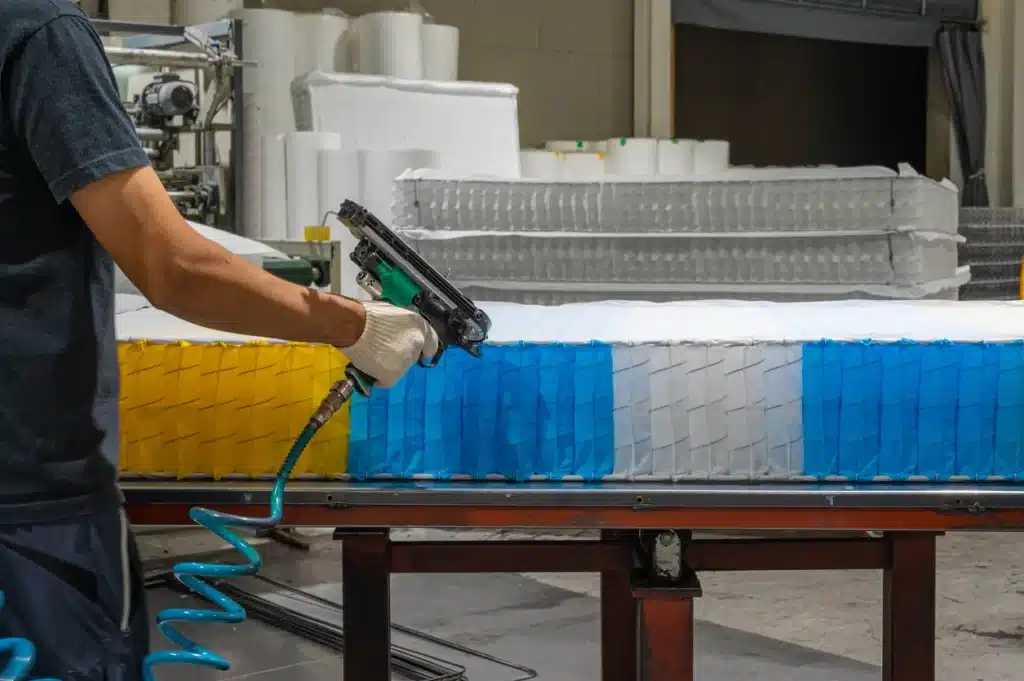Every night, we lay down on our mattress, hoping for a good night’s sleep. But the question often arises – how much does it cost to make a mattress? This guide aims to answer this question, delving deep into the world of mattress manufacturing, the costs involved in the process, and why those costs matter to you, the consumer.
The Raw Materials
When it comes to building a quality mattress, everything starts with high-quality materials. Whether it’s memory foam for a foam mattress, springs for a spring mattress, or latex for a latex foam mattress, the materials determine not just the cost but also the comfort and longevity of your mattress. Let’s delve into the specifics.

Memory Foam: The Modern Standard
Memory foam mattresses have risen in popularity due to their unique pressure-relieving properties. The high-density foam contours to your body, providing customized support. However, the production cost for a memory foam mattress tends to be higher due to the sophisticated manufacturing process required to create memory foam, often costing between $60 and $80 per cubic foot.
Latex Foam: The Eco-friendly Option
Latex foam is another popular choice, appreciated for its elasticity and eco-friendly properties. Derived from the sap of rubber trees, this material is processed into a comfortable, resilient foam. Its eco-friendly nature often makes a latex foam mattress costlier than other foam mattresses, with prices ranging from $80 to $120 per cubic foot.
Springs: The Classic Choice
Innerspring mattresses, or spring mattresses, have been around for many years. They feature a core of steel coils that provide a traditional bounce and strong support. Their cost depends on the type and number of coils used, the gauge (thickness) of the metal, and any additional features like individually pocketed coils. Springs can cost anywhere from $1 to $5 each, depending on their quality.
| Mattress Type | Average Cost |
|---|---|
| Memory Foam | $500 – $2500 |
| Latex | $700 – $3000 |
| Innerspring | $300 – $1500 |
| Hybrid | $600 – $3000 |
| Tempurpedic | $2000 – $5000 |
Read also: Should you remove the plastic from a new mattress?
Beyond the Materials: Labour, Manufacturing and Markup
High-quality materials alone do not make a quality mattress. The expertise of the mattress manufacturer, the intricacies of the manufacturing process, and the expenses related to marketing, distribution, and retail markup significantly contribute to the final mattress cost.
Labor and Manufacturing Overheads
Custom mattresses, particularly, involve a high degree of craftsmanship and thus command a higher price. They are often more labor-intensive, requiring skilled workers to assemble the materials, adhere to strict quality standards, and often, tailor the product to individual customer specifications.
Skilled labor for making a mattress can cost around $100 to $200 per piece. Manufacturing overheads, which include machinery maintenance, utilities, factory space rental, and depreciation, account for about 30% of the production cost, or around $150 to $300 per mattress.
Marketing and Distribution
Every mattress brand spends a considerable amount on marketing their products to stand out in the highly competitive market. Distribution, including inventory management and delivery logistics, further adds to the cost. This part of the journey of a mattress from the factory to your bedroom significantly influences the final price you pay.
Marketing expenses can add an additional $50 to $100 to the cost of each mattress. The distribution process, which involves warehousing, inventory management, and delivery to the customer, adds another $50 to $100 per mattress.
Retail Markup
While shopping at a retail store, you’re also paying for the store’s operational expenses and their profit margin. This is the retail markup, which can sometimes be as much as 100% of the cost price. This markup covers the retailer’s expenses such as staff salaries, store rent, and profit margins. Online mattress companies can often sell at a lower price by cutting out the middleman and selling directly to the consumer.
The Cost of Customization: Size, Type and Personal Preferences
Size Matters
Whether you’re looking for a queen size mattress, a king mattress, or even a California king, the size of the mattress you choose directly impacts the cost. Larger mattresses require more materials and more work to manufacture, which in turn leads to a higher price tag.
The Allure of Custom Mattresses
Some sleepers have unique needs or preferences that mainstream mattresses cannot fulfill. This is where custom mattresses come in. From antique beds to recreational vehicles to loft spaces, custom mattresses can be made to fit a variety of unique spaces and meet specific comfort preferences. However, keep in mind that custom mattresses are often more expensive due to the additional work involved in customizing the product to your specific requirements.
Comfort and Support
When choosing a mattress, your preferred sleeping position, body weight, and any health concerns can all influence the type of mattress that is best for you. Side sleepers might prefer a softer mattress that cushions their shoulder and hip pressure points, while back or stomach sleepers might require a firmer mattress for adequate support. A mattress that suits your individual sleep preferences not only provides the best night’s sleep but can also save money in the long term by reducing the need for frequent replacements.
The Era of Hybrid and Specialty Mattresses
The innovation in the mattress industry has led to the development of new types of mattresses, such as hybrid mattresses and Tempurpedic mattresses, which combine the best features of existing mattress types.
Hybrid Mattresses
Hybrid mattresses combine the supportive coils of a traditional spring mattress with the comfort and pressure relief of memory foam or latex. They offer a “best of both worlds” solution to sleepers who prefer the bounce of an innerspring mattress but also want the benefits of foam. The manufacturing process for a hybrid mattress involves additional steps, which can make a hybrid model slightly more expensive than a standard one-material mattress.
Tempurpedic and Other Specialty Mattresses
Tempurpedic is a brand known for its premium memory foam mattresses, which utilize a proprietary type of memory foam called TEMPUR material. This material is renowned for its superior pressure relief and durability. Other specialty mattresses may feature organic materials, innovative cooling technologies, or targeted support systems, and their prices vary widely based on these features.
The Influence of Certifications and Standards
Today’s informed consumers often look for certifications and standards that ensure the quality and safety of their mattresses. Certifications like the Global Organic Textile Standard (GOTS) certify that a mattress is made with a certain percentage of organic materials and adheres to environmental and social standards throughout its production process.
Certifications like these can increase a mattress’s cost, but they also provide reassurance that you’re getting a high-quality, ethically made product.
Why are mattresses so expensive?
When it comes to mattresses, the cost can be quite high. But why are mattresses so expensive? The answer is that there are a number of factors that contribute to the price of a mattress.
First, the materials used in a mattress can be costly. High-quality mattresses use materials like memory foam, latex foam, and pocket springs which can add to the overall cost. Additionally, some mattresses may include features such as cooling technology or adjustable firmness levels which can also increase the price.
Second, mattresses come in a variety of sizes and styles. From single to super king size beds, there is something for everyone. This means that manufacturers must produce different types of mattresses in order to meet consumer demand. This adds to production costs and ultimately affects the price of the mattress.
Finally, many companies offer free delivery or other incentives when you purchase a mattress from them. These additional services add to the cost of your mattress but make it more convenient for you as a customer.
All these factors combined mean that mattresses can be quite expensive but they are worth it if you want quality sleep and comfort for years to come!
How much should I spend on a new mattress?
When it comes to buying a new mattress, the amount you should spend depends on your individual needs and preferences. Generally speaking, most mattresses today cost between $200 and $1500. However, if you’re looking for a more luxurious mattress with higher quality materials, you may end up spending upwards of $5000 or more.
At the lower end of the spectrum, budget mattresses can range from around $250 to $1000 depending on size. If you’re looking for something in the mid-range price bracket, expect to pay between $1500 and $2000 for a queen size mattress. For those seeking top-of-the-line luxury mattresses, prices can go as high as $10,000 or more.
Ultimately, the amount you should spend on a new mattress depends on your budget and what type of mattress best suits your needs. It’s important to do your research before making a purchase so that you get the best value for your money. Consider factors such as comfort level, firmness rating, materials used and durability when making your decision.
Read also: How long does it take to adapt to a new mattress?
Conclusion: How much does it cost to make a mattress?
On average, it costs around $450 to $650 to manufacture a quality mattress. This cost includes raw materials, labor and manufacturing overheads, marketing and distribution expenses, and retail markup. Different types of mattresses will have varying production costs depending on the type of material used and other factors. Ultimately, the final price tag is determined by the retailer.
The complexity of mattress production and the various elements involved in its creation can make it difficult to determine exactly how much a mattress costs. However, understanding the basic cost elements involved in its manufacture provides valuable insight into this important component of a good night’s sleep.
